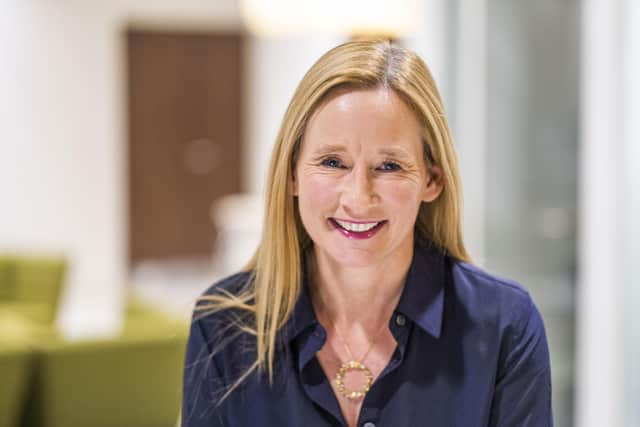Interview: Angela Mitchell, senior partner for Deloitte in Scotland, on fostering prosperity
Angela Mitchell is also noting efforts by the professional services giant to help better the fortunes of Scotland as a whole in various ways, including its Shaping Scotland’s Future Economic Landscape initiative, having hosted this event in November 2022 to help foster sustainable, inclusive economic growth. It united 70 clients, contacts and stakeholders from across Scotland's public, private and third sectors, as well as academia, to deliver “tangible” change.
And in June of this year, a follow-up with the same mix of attendees took place “really to build further on the momentum from that first session, and to progress some tangible actions around a smaller set of themes”. These, specifically, comprise entrepreneurial people and culture; net zero market opportunities; and skilled workforce, linked to the National Strategy for Economic Transformation for Scotland as per the previous event, and with guest speakers including Gregor Irwin, Scotland’s Director-General Economy, and Professor Mairi Spowage of the Fraser of Allander Institute.
Advertisement
Hide AdAdvertisement
Hide Ad“It's always fascinating because you get all these different perspectives,” says Mitchell, adding that the event united influential names with the same end goal, “having a common sense of energy and passion... it was quite exciting”.


She adds that in the next few months, the wheels will keep turning to bring aims of the discussions into reality. “We do want it to be action-focused and not just a talking shop,” aiming to action some goals within the next six months.
Looking at initiatives already under way by Deloitte, Mitchell points out that it has this year introduced its schools programme in Scotland, working with schools in Aberdeen, Glasgow, and Edinburgh on the likes of breaking down barriers to employment and education, with the firm donating laptops and running employability workshops, for example. It is also looking to import into Scotland an existing apprenticeship academy it has fostered.
Fostering women in the workplace is also a key passion of Mitchell’s, who herself made history by being the first female ever appointed to her current role, having led its public sector practice in Scotland for 12 years. She says Deloitte has increased its proportion of female partners to about a third within Scotland and the UK as a whole. “So still more to go, but definitely a positive trajectory.”
Deloitte has also released its Women @ Work 2023: A Global Outlook report, polling 5,000 women across ten countries, noting that rates of burnout have dropped, to just under 30 per cent from 46 per cent last year, while lack of flexibility was one of the top-cited reasons for women who chose to leave their employer in the past 12 months, for example.
Mitchell, who has been with Deloitte for nearly three decades, originally studied laser physics, but while she liked the analytical and logical aspect, she decided that she ultimately wanted to work with people rather than “in a dark lab looking at small lights”. She then did a masters in IT, and “I've not regretted my decision once because I love the variety and the challenge that consulting brings".
As for Deloitte’s own workforce, its Scotland division in July of this year announced that it had promoted Paul Hazelton to audit partner while 15 colleagues had been bumped up to director level across five business practices, while more recently it unveiled slick new offices in Edinburgh including 360-degree cameras and “dancing walls”.
Mitchell notes that 250 of Deloitte’s 900 staff north of the Border are “aligned” to finance, an area she would like to expand. “Scotland’s financial services sector is outstanding and very active. And we're a big part of that. But I do think that there's much more opportunity for us to drive more economic growth out of that.”
Advertisement
Hide AdAdvertisement
Hide AdHer priorities now are for Deloitte to scale its financial services and digital businesses, and net zero team and activity, for example, while she is enjoying her role enabling her to meet clients across all different sectors, learning about their businesses, industries, challenges, and opportunities.
"And I found, actually, there are a lot of common challenges across all sectors, so skills absolutely always comes up. Achieving net zero is something that [also] comes up regardless of company… I’ve really enjoyed connecting the dots between those organisations and parts of our firm that can help. Hearing all these different perspectives, and making new connections is always really interesting."
Such encouragement comes amid a still-choppy economic sea – interest rates remain elevated, for example. And Deloitte’s own UK CFO Survey for the second quarter of this year found that confidence among finance chiefs at the country’s largest firms had dipped, with almost half now rating the levels of external financial and economic uncertainty facing their businesses as high or very high, up from 39 per cent in the prior three-month period.
“We've stayed close to our clients over the last year, helping them increase resilience in particular, and maximising the opportunities that are available to them. You can still grow in a challenging environment, you just need to pick the right opportunities and use the right levers,” says Mitchell. As for the broader economic impact of Deloitte, which has come under further scrutiny for its activity, "I do hope that we can look back in a few years’ time and think, ‘actually, we made a difference in terms of building Scotland's economy’.”
Comments
Want to join the conversation? Please or to comment on this article.